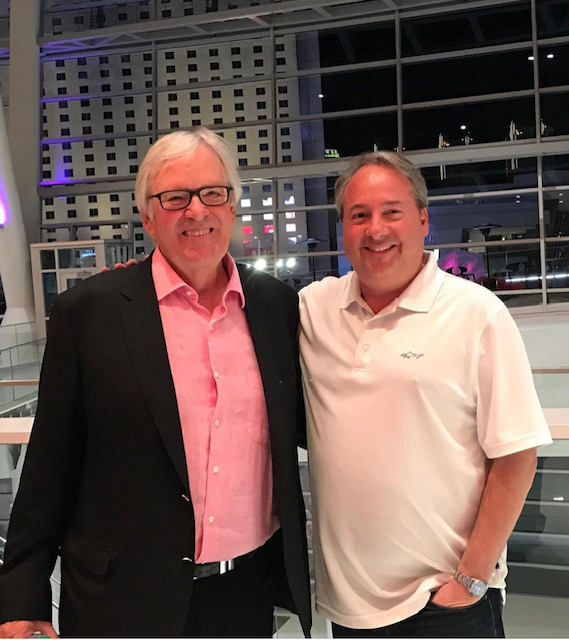Lifestyle
Jay Bloom on Working With Fortune 500 Companies and Keeping It “World Class”

Establishing a classical financial and analytical career has been a passion for entrepreneur Jay Bloom. His experience with Fortune 500 financial institutions has provided a wealth of knowledge that he has used in his business ventures, including Pegasus Group Holdings, which owns and operates utility scale renewable energy installations providing the nations power grid. Each experience has helped Jay grow in his understanding of and appreciation for world-class business operations.
Build Your Portfolio
Jay’s career with Fortune 500 companies began with Manufacturers Hanover Trust Co., which eventually acquired Chemical Bank (which in turn acquired Chase Bank, followed by JP Morgan Chase). Although he started out as an officer for the bank, he was fast-tracked and put into a management and credit training program. He quickly built experiences from there, working with C-level executives on real estate loans and REO portfolios. This experience whet his appetite for more and led to his personal business ventures.
Use the Experience
His background with Fortune 500 companies at the bank gave Jay Bloom a keen understanding of how successful businesses grow and thrive. More and more savvy entrepreneurs are finding this experience to be valuable in creating their own world-class businesses. In fact, according to Neil Patel of the Angels and Entrepreneurs Network, startups are really the next generation of the Fortune 500.
Jay took what he learned in the banking industry and applied it to a wide variety of businesses across industries throughout the years. He has worked with early-stage businesses, mid-cap acquisitions, and venture capital transactions. All of that early work with Fortune 500 companies gave him the tools to create new revenue streams, negotiate deals, and develop successful operations in his own ventures.
Building Your Version of a Fortune 500
Like most savvy entrepreneurs, Jay Bloom is constantly building on past experiences and acquiring new knowledge to expand his opportunities and strengthen deals for himself and his business partners. This has led to great personal and professional successes, such as establishing large utility scale renewable energy installations.
What is a Fortune 500 company, anyway? According to Fortune, the companies on the list represent two-thirds of the U.S. economy; they include some of the biggest, most recognizable names in their industries. Primarily, in today’s world, they are savvy and flexible. They’ve eschewed old models of business and embraced new ones that incorporate technology. They are always ready to pivot to stay on top.
These are the tools that have helped Jay Bloom launch many successful ventures. Incorporating these elements into your own startup can ensure that you’re keeping it world-class.
Lifestyle
When Seasons Shift: Dr. Leeshe Grimes on Grief, Loneliness, and Finding Light Again

Some emotional storms arrive without warning. A sudden change in weather, a holiday approaching, or even a bright sunny day can stir feelings that don’t match the world outside. For many people, the hardest seasons are not defined by temperature; they are defined by what’s happening inside, where grief and loneliness often move quietly.
This is the emotional terrain where Dr. Leeshe Grimes has spent her career doing some of her most meaningful work. As a psychotherapist, registered play therapist, retired U.S. Army combat veteran, and founder of Elevated Minds in the DMV area, she understands how deeply seasonal shifts and unresolved grief can affect people. Her upcoming books explore this very space, guiding readers through the emotional weight that can appear during different times of the year.
What sets Dr. Grimes apart is her ability to see clearly what many people overlook. Seasonal depression, for example, is usually tied to winter months. But she often sees it appear during warm, bright seasons, the times when the world seems happiest. For someone already grieving or feeling disconnected, watching others travel, celebrate, or gather can create its own kind of heaviness. Sunshine doesn’t always lift the mood; sometimes it highlights what feels missing.
The same misunderstanding surrounds grief. Society often treats it as a short-term experience with predictable phases and a clean ending. But in her practice, Dr. Grimes sees how grief keeps evolving. It doesn’t disappear on a timeline. It weaves itself into routines, memories, and milestones. People learn to carry it differently, but they rarely leave it behind completely. And that’s not failure, it’s human.
Her approach to mental health centers on truth rather than pressure. She encourages clients to acknowledge the emotions they try to hide: sadness that lingers longer than expected, moments of joy that feel out of place, and the waves of loneliness that return even when life seems stable. Instead of pushing for quick recovery, she focuses on helping people understand how emotions shift and how to care for themselves through those changes.
Much of her insight comes from her military years, where she witnessed the emotional toll of loss, transition, and constant survival. She saw how people continued functioning while carrying pain that had nowhere to go. That experience shaped her belief that healing requires space, space to feel, to speak, and to move through emotions without judgment.
In her clinical work today at Elevated Minds, she encourages people to build small, steady habits that anchor them during difficult seasons. Journaling helps them recognize patterns and name what feels heavy. Community support breaks the cycle of isolation. Therapy creates a place where emotions don’t have to be minimized or explained away. And intentional routines, daily sunlight, mindful breaks, and calm evenings help rebuild emotional balance.
Her upcoming books expand on these ideas, offering practical guidance for navigating both grief and seasonal depression. She focuses on helping readers understand that healing is not about escaping pain. It’s about learning how to live with it in a healthier way, honoring memories, acknowledging loneliness, and still allowing room for moments of light.
What makes Dr. Leeshe Grimes a compelling voice in mental health is her ability to bring language to experiences that many struggle to explain. She reminds people that emotional seasons don’t always match the weather and that there is no single path through grief. But within those shifts, she believes there is always a way forward.
The seasons will continue to change. And with the right tools, compassion, and support, people can change with them, finding steadiness, softness, and light again, one step at a time.
-

 Tech5 years ago
Tech5 years agoEffuel Reviews (2021) – Effuel ECO OBD2 Saves Fuel, and Reduce Gas Cost? Effuel Customer Reviews
-

 Tech6 years ago
Tech6 years agoBosch Power Tools India Launches ‘Cordless Matlab Bosch’ Campaign to Demonstrate the Power of Cordless
-

 Lifestyle7 years ago
Lifestyle7 years agoCatholic Cases App brings Church’s Moral Teachings to Androids and iPhones
-

 Lifestyle5 years ago
Lifestyle5 years agoEast Side Hype x Billionaire Boys Club. Hottest New Streetwear Releases in Utah.
-

 Tech7 years ago
Tech7 years agoCloud Buyers & Investors to Profit in the Future
-

 Lifestyle5 years ago
Lifestyle5 years agoThe Midas of Cosmetic Dermatology: Dr. Simon Ourian
-

 Health7 years ago
Health7 years agoCBDistillery Review: Is it a scam?
-

 Entertainment7 years ago
Entertainment7 years agoAvengers Endgame now Available on 123Movies for Download & Streaming for Free
